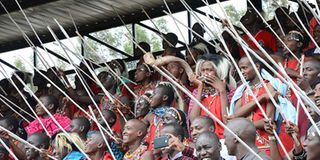It’s not yet Uhuru for most Kenyans

Narok residents celebrate the arrival of President Uhuru Kenyatta at Narok stadium for Madaraka Day celebration on June 1, 2019. Madaraka was essentially about autonomy — not just for the state but most importantly for the people. PHOTO | MACHARIA MWANGI | NATION MEDIA GROUP
What you need to know:
- The new oppressors understood that they didn’t stand a chance unless they mentally subdued the people, and they did.
- Because of this fallacious belief in blind obedience, the majority of Kenyans are currently struggling to meet their primary needs.
It is hard to write about Kenya, especially on Madaraka Day, when there’s so much about freedom that exists for the elite.
The levels of injustice and unprecedented wrongs are so high it is as if we are bordering on a hopeless paralysis.
It’s even harder to perceive that Kenya’s independence is equal to people’s independence when the reasons Madaraka was fought for are still present among us.
Madaraka was essentially about autonomy — not just for the state but most importantly for the people.
It was in a broad sense about people being able to farm their lands, trade and feed their families, claim what was already theirs, get equal opportunities, associate without worry and speak freely without punishment.
Five decades later and Kenya is gradually destroying its people’s livelihoods as farmers, teachers, doctors, artists, writers, manufacturers, athletes and everyone else is lamenting while scrambling to make a living.
OPPRESSION
Madaraka was meant to reside in our fibre, protecting the people and their right to live prosperously, but I guess what we didn’t imagine was being short-changed and put in the hands of new oppressors.
The new oppressors live among us and are more concerned about holding the people’s autonomy captive.
When the new oppressors got into political power, their first agenda was to immediately take the people’s tongues and fill their backbones with fear in the knowledge that the people weren’t descendants of fearful liberators.
True liberators possessed, imagined and stood up for freedom despite the weighty colonial chains.
Having known this, the new oppressors understood that they didn’t stand a chance unless they mentally subdued the people, and they did.
They beat, tortured and murdered many people into learning the language of silence, by making blind obedience our culture.
STRUGGLE
This blind obedience culture is why it’s hard to write about present-day Kenya because we are a politically, socially and economically wounded people who’ve been scammed for so long by leadership.
We remain obediently blind even when we struggle beyond measure but insist on calling it resilience.
We regularly get discriminated by the system but somehow, because we have accepted abuse, we move on. Patriotic citizens are supposed to only say yes.
Because of this fallacious belief in blind obedience, the majority of Kenyans are currently struggling to meet their primary needs, such as putting proper food on the table, having decent housing, accessing clean drinking water, affordable healthcare and securing gainful employment, among many things that Madaraka had already secured only for them to be stolen from us.
The plenty that is found within our borders is equally sharable and can relieve the people of their daily pressures of enduring an economy that is a theoretical rose but a practical thorn.
However, this isn’t happening because those who inherited our freedom decided to ration our rights and limit our access. What then does Madaraka mean when the people do not enjoy their rights and freedom?
The writer is a policy analyst; [email protected]





